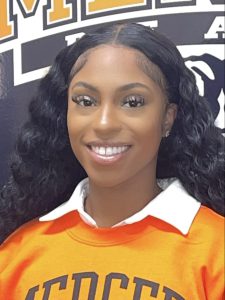Daekiara Smith-Ireland
Staff

What is your area of research or expertise that you bring to the Landscapes collaboration?
I am a first-year epidemiology doctorate student with experience in minority health and epidemiology. So, with the goal of understanding the core causes of racial inequalities in population health, I wish to bridge my knowledge of minority health, disparities, and epidemiology.
What do you find challenging or exciting about interdisciplinary collaboration?
One thing that excites me is hearing different people’s approaches to problem solving and working around obstacles. Interdisciplinary collaboration is one of the most efficient approaches for conducting research. People from various disciplines and backgrounds can contribute unique ideas on how to address a scientific topic. When we collaborate, there is never just one method to address a problem. Collaboration becomes difficult when people are not receptive to other people’s backgrounds and experiences. When collaboration is done correctly and with the right individuals, it can bring such a unique approach as well as learning experiences for everyone involved.
What’s one common misconception about your area of research that you’d like to dispel?
One common misperception I hear about public health is that it is limited to individuals who wish to conduct research. The field of public health is extremely diversified. Most people in the public health profession have backgrounds in psychology, nursing, medicine, law, exercise science, sociology, ecology, and other fields. Not everyone who enters the field of public health wants to perform research; some want to serve as directors, consultants, information officers, and so on. And these individuals are equally as vital as those who perform research.
How did you become interested in structural racism and health?
As an African American woman, it became evident to me during my undergraduate and graduate studies that inequalities and disadvantages among the black community continue to rise and worsen. Furthermore, research on health among the black community is frequently limited, prejudiced, or out of date. This inspired me to pursue a career engaging people of color, dedicated to reducing the myriad racial inequities experienced in a variety of ways that negatively impact our health. Finding answers to this problem can aid in the more effective dismantling of structural racism among people of color.
What’s the academic path that brought you to where you are now?
I began my undergraduate studies as a Biology major at Clark Atlanta University, where I was initially introduced to public health and took courses in Epidemiology and community health education. After earning a B.S. in Biology, I debated whether to pursue a career in medicine or public health. So, I returned to school, enrolling in Mercer University’s Master of Public Health degree to hone my abilities and expertise in the public health field while also preparing for the DrPH program. During my MPH, I thoroughly enjoyed learning from a diverse group of professors, discovered a wonderful mentor who continues to mentor me today, and developed new skills such as quantitative and qualitative analysis. After graduating in 2022, I knew I wanted to continue my education, specifically in Social Epidemiology. I’m back at Mercer, this time for a DrPh in Social Epidemiology. I’m curious about how social epidemiology and research relate to race, mental health, and overall health among minority populations, particularly African Americans. Since beginning my doctoral studies, I’ve been extremely fortunate to have some of the same great professors and mentors who have placed me with public health organizations related to my interests, where I’ve gained valuable experience in areas such as assisting with intervention implementation, designing my own intervention for Bibb and Macon County Schools, presenting at conferences, and more. Using my MPH knowledge, current knowledge and experience from my DrPH, I am now at Emory University, where I am conducting research on minority health and collaborating with great teams such as the Landscape of Structural Racism and Health to combat racial and health disparities.
If you had the opportunity to get one question answered by an omniscient being, what would you ask? (this is meant to be a lighthearted question–we’re trying to get to the heart of what you are most curious about, whether within your field of research or beyond! Feel free to think big!)
I would ask if there are alternate universes, might someone who looks precisely like me be living a completely different life than in this universe? My friends and I joke all the time about how there could be a doppelganger in another universe who is a doctor, an astronaut, an artist, a genius, a mad scientist, or even the president! I’d like to know, but I’m not sure I’d want to meet my doppelganger because that would be kind of scary.
Anything else you want to share?
I appreciate the opportunity to be highlighted and am thrilled to be a part of this great team.
